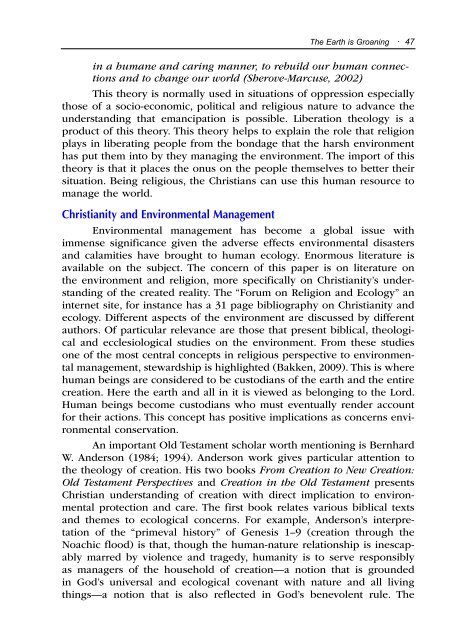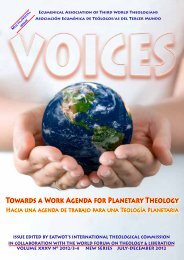voices-2013-2&3 - EATWOT's International Theological Commission
voices-2013-2&3 - EATWOT's International Theological Commission
voices-2013-2&3 - EATWOT's International Theological Commission
Create successful ePaper yourself
Turn your PDF publications into a flip-book with our unique Google optimized e-Paper software.
The Earth is Groaning · 47in a humane and caring manner, to rebuild our human connectionsand to change our world (Sherove-Marcuse, 2002)This theory is normally used in situations of oppression especiallythose of a socio-economic, political and religious nature to advance theunderstanding that emancipation is possible. Liberation theology is aproduct of this theory. This theory helps to explain the role that religionplays in liberating people from the bondage that the harsh environmenthas put them into by they managing the environment. The import of thistheory is that it places the onus on the people themselves to better theirsituation. Being religious, the Christians can use this human resource tomanage the world.Christianity and Environmental ManagementEnvironmental management has become a global issue withimmense significance given the adverse effects environmental disastersand calamities have brought to human ecology. Enormous literature isavailable on the subject. The concern of this paper is on literature onthe environment and religion, more specifically on Christianity’s understandingof the created reality. The “Forum on Religion and Ecology” aninternet site, for instance has a 31 page bibliography on Christianity andecology. Different aspects of the environment are discussed by differentauthors. Of particular relevance are those that present biblical, theologicaland ecclesiological studies on the environment. From these studiesone of the most central concepts in religious perspective to environmentalmanagement, stewardship is highlighted (Bakken, 2009). This is wherehuman beings are considered to be custodians of the earth and the entirecreation. Here the earth and all in it is viewed as belonging to the Lord.Human beings become custodians who must eventually render accountfor their actions. This concept has positive implications as concerns environmentalconservation.An important Old Testament scholar worth mentioning is BernhardW. Anderson (1984; 1994). Anderson work gives particular attention tothe theology of creation. His two books From Creation to New Creation:Old Testament Perspectives and Creation in the Old Testament presentsChristian understanding of creation with direct implication to environmentalprotection and care. The first book relates various biblical textsand themes to ecological concerns. For example, Anderson’s interpretationof the “primeval history” of Genesis 1–9 (creation through theNoachic flood) is that, though the human-nature relationship is inescapablymarred by violence and tragedy, humanity is to serve responsiblyas managers of the household of creation—a notion that is groundedin God’s universal and ecological covenant with nature and all livingthings—a notion that is also reflected in God’s benevolent rule. The





